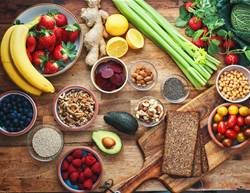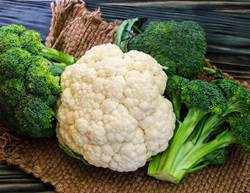Fibre – the indigestible parts of plant foods, such as vegetables, fruits and whole grains - is a super-ingredient in more ways than one. It not only slows digestion to keep you full but also reduces cholesterol absorption in your intestines, helping maintain heart and digestive health. But most of us don’t get enough. The average Australian consumes about 20g of fibre per day, which falls short of the reccomended daily intake for men of 30g and for women, 25g. Making these mealtime food swaps will help boost your fibre intake and may even offer bonus health perks.
Instead of sour cream...
SWAP IN Hummus (2g fibre per 2 tbsp serving) This classic Mediterranean spread has more fibre, vitamins, minerals and less saturated fat than sour cream, says dietitian Kathleen Johnson. It also provides bone-building phosphorus and magnesium. Use it as a dip, to top a Greek salad or in wraps.
Instead of green juice...
SWAP IN Leafy greens such as English spinach or kale (4g fibre per 3-cup serving) A study in the journal Appetite confirmed that fresh produce keeps you satiated longer than trendy juices do. “While you get some nutrients from the green juice, you’re stripping many of them away, especially fibre, during juicing,” says dietitian Tanya Zuckerbrot. Make salads ahead or keep a bag of greens on hand in the office to make easy lunchtime sandwiches and salads.
Instead of pasta...
SWAP IN Lentils (7g fibre per 1 cup serving, cooked) Just like pasta, lentils contain a hearty dose of carbohydrates... but also much, much more. A 2017 review in the International Journal of Molecular Sciences found that lentils have the highest insoluble dietary fibre content of any pulse and are high in pre-biotics, which promote gut health. “Lentils make a great booster for soup in place of pasta,” says Johnson. Toss them through your next bolognaise.
Instead of potato chips...
SWAP IN Popcorn (2g fibre per 2 cup serving) “Potato chips are filled with empty kilojoules and lack fibre,” Zuckerbrot says. Whereas popcorn offers fibre and healthy compounds. University of Scranton researchers found it has 300mg of polyphenols per serving, 15 times more than wholegrain tortilla chips. Pop it on the stove with canola oil and season with cayenne or cinnamon.










